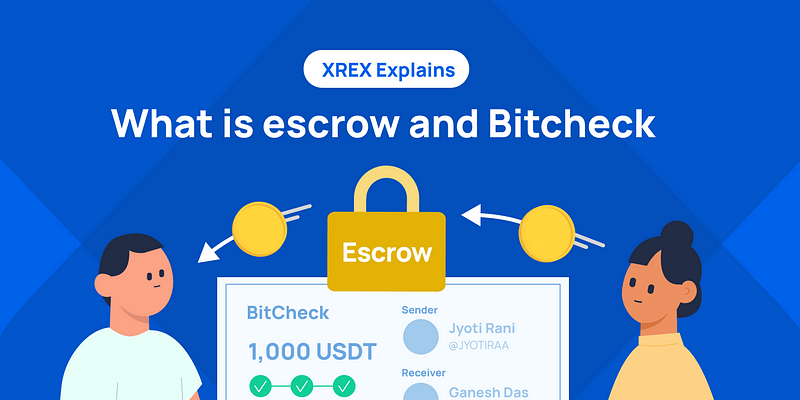Today, we live In a highly digitalized world. We are all familiar with digital modes of payment.
Comparing traditional cash deals or physical transactions with digital payments simplifies the process — people are able to transact with each other even when they are in different locations. However, trust is always an issue; this is exactly where escrow comes into play.
How to ensure transactions go smoothly and both parties fulfill their responsibilities, particularly when both sides are not familiar with each other? The answer is to use an escrow service.
In this article and the video attached, Fred and Krish from XREX will help us to understand in detail what is escrow and how XREX’s BitCheck helps make cross-border payments, international transfers, and crypto P2P transactions easier and secure. Watch the video below and feel free to share your thoughts with us!
Below are key takeaways from Fred and Krish’s introduction about escrow services and XREX’s BitCheck:
➤ What is escrow?
Escrow is a custody service that offers custody of an asset for a specific period of time. An escrow is a legal arrangement in which a third party temporarily holds money or property until particular terms and conditions which both sides agreed upon are fulfilled.
➤ What is BitCheck?
BitCheck is the star feature on the XREX platform which provides the most secure online payment guarantee to escrow cryptocurrencies and funds for global transactions. BitCheck is not just escrowing Bitcoin, but escrows any other stablecoins and cryptocurrencies that XREX supports such as USDT, USDC, XRP, ETH, SOL, and more.
➤ What problems does BitCheck solve?
BitCheck solves two major issues — funds and trust. Only users who pass identity verification can use BitCheck on XREX. XREX works with global compliance partners, including Sum&Substance (Sumsub), Mastercard’s CipherTrace, and JPMorgan’s portfolio TRM Labs to build proper Know Your Customer (KYC) mechanisms and risk management systems.
— Only verified users can use BitCheck
— Detect and defend against fraud, scammers, and suspicious activities
— Solves the trust issue
➤ How Bitcheck is used in B2B scenario
Cross-border merchants and corporates have started accepting stablecoins like USDT and USDC for business payments. BitCheck becomes their best tool to send and accept payments.
For example, a buyer sends payments via BitCheck to the seller. Before receiving and confirming the goods, the payment will be escrowed by BitCheck. Once the goods are shipped and checked, the seller will request to release the BitCheck. Then the buyer releases the funds. All these steps can be done on the XREX app.
➤ How BitCheck is used in C2C scenario
Working professionals abroad need to send funds home to support their families. Cryptocurrency has become a popular tool. They send USDT via BitCheck to their friends and families who can later convert it to local currency and withdraw from their banks. Compared to traditional remittance channels, this makes international transfers much faster and cheaper.
➤ How BitCheck is used to minimize risk in P2P scenario
While P2P transactions seem to have gained popularity with users looking for ways to purchase cryptocurrencies, it has not been without risks. Users have reported unfulfilled P2P deals that resulted in a loss of funds, or a foreign counterparty that sent acquired crypto via illegitimate means. This is where BitCheck and the BitCheck contract come into play as BitCheck provides escrow service and BitCheck contracts to minimize counterparty risks.
➤ Risk of default in BitCheck
Although there is always a risk in a transaction that involves two parties, (see Krish’s introduction in the video), there has never been an unsettled BitCheck case since its launch in September 2020. If one does not honor the BitCheck, their reputation will be at risk, and funds will remain escrowed until the other party agrees to cancel it.




